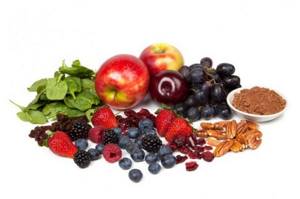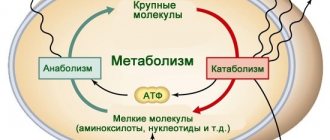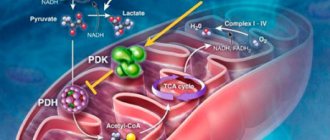Don't go hungry!
Any extreme diet or, even worse, fasting is wrong and unhealthy!
People who consume less than 1,200 calories per day have a slower metabolic rate of more than 45%. This threatens not only the opposite effect (the weight, as they say, may rise), but also metabolic disorders. To find out how many calories you need per day, multiply your current weight by 25 (for example, if you currently weigh 65 kg, your daily calorie intake should be 1625 kcal).
If you are going to lose weight, then the number of calories can be gradually reduced, but not fall below the 1200 bar.
Accelerating metabolism while losing weight[edit | edit code]
Many people try to achieve a “metabolic boost” and weight loss through intense muscle-building exercises, diets, or supplements. But in reality this is incredibly difficult to do.
While there are certain foods—coffee, chili, and other spices—that can speed up your metabolism just a little, the changes are so minor and short-lived that they would never affect your figure.
However, building muscle may be a little more beneficial. At any weight, the more muscle and less fat you have in your body, the faster your metabolism. The thing is that muscle consumes much more energy at rest than fat (take a look at the graph in the first part).
But if you're building muscle and effectively speeding up your metabolism, you need to fight the natural tendency to want to eat more that comes with a fast metabolism.
Many people feed themselves into the hunger that comes with long periods of exercise and simply end up adding fat to their muscles. Jensen also noted that people have a hard time keeping up with the workouts needed to maintain the muscle mass they've gained. Overall, he stated, “You have only a small amount of control over your metabolic rate. This control usually looks relatively modest, and, unfortunately, it has shortcomings.”
Read more:
how to speed up metabolism
Balance your body's PH
The pH factor (acid-base balance) is one of the most important aspects of health and a determining factor in proper metabolism. You can regulate the body's PH with proper nutrition: your diet should contain equal amounts of alkalizing and acidifying foods. The first group of foods includes fresh fruits and vegetables, the second includes dairy products, eggs, fish, poultry, beans, meat, nuts, sugar, grains/cereals.
You can determine your acid-base balance at home: just purchase special test strips (read about the test process on the packaging). The pH factor you can use as a guide is 7.35.
The role of water in metabolism
Water is present in every cell of our body - it accounts for about 70% of the total body weight. This is the most important substance after air, so its deficiency is very painful. Every metabolic process in any of the systems of our body requires a sufficient amount of moisture. If it is deficient, some body functions may even be temporarily disabled in order to save energy.
All nutrients and “transitional” metabolic products are dissolved in water. It is the basis of acid-base balance, thermoregulation and osmotic pressure. These three basic functions of normal life should not be disrupted, except for a short time. If failures are repeated regularly, the body reacts with the appearance of pathologies that threaten to become chronic. This is especially noticeable in the example of the acid-base balance, which, if disturbed in any direction, causes lethargy, apathy and the appearance of excess weight. All this, combined with the supply of minerals, which are also largely supplied with liquid, forms the basis of a full life and longevity.
The need for water is determined by many factors, from age and anthropometry, to temperature and even psychological state. The approximate norm is about 40 ml per kilogram of body weight in a state of relative rest. With physical or intellectual stress, hot weather, taking medications or “involvement” in bad habits, this need increases. It is generally accepted that the average person should drink about 1.5-2 liters of liquid. It doesn’t have to be pure water – juices, tea, and dairy products are also considered. Another 400-700 ml of water should be ingested with solid food. This is also an important part of digestion and metabolism. By the way, the body itself is able to “produce” a little liquid, which is formed during the absorption of protein and carbohydrates; fats participate less in this process.
The question: how does a lack or excess of water affect metabolism is not so easy to answer. On the one hand, science has long known that excess fluid can provoke exacerbations of heart and vascular diseases. The kidneys may be damaged, and the overall psychological state will not be good either. On the other hand, lack of water is much more dangerous. For example, a deficiency of only 5% is pronounced thirst, and over 20% is already fatal.
For the harmonious operation of the metabolic system, a slight excess of moisture is preferable to a lack. With chronic “dehydration,” the absorption of protein foods and the removal of its breakdown products may be impaired. This partly applies to other nutrients, but the body knows how to cope with them. But protein “waste” can cause quite unpleasant intoxication. To avoid such negativity, water consumption should not be reduced. If you are overweight (especially in significant amounts), your water balance must be maintained very strictly. The effect of water on metabolism is not always linear. For example, apathy, chronic fatigue and other “periodepressive” conditions slow down metabolic processes. Water washes away “excess mental activity” and stimulates the work of all systems.

Stay on the move
Any physical activity helps speed up your metabolism. To do this, you don’t have to go to the gym or devote yourself to any sport. Skate and ski, run, walk more and with this you will already begin to speed up your metabolism and actively burn calories. By the way, you can do physical exercise not only in the morning and during the day: teach your body to slow down the pace of life in the evening by starting, for example, going dancing after work. Attention: finish exercises approximately 3 hours before bedtime!
How to increase metabolism after 40 years
After 30 years, metabolic processes are disrupted. Adipose tissue increases. There is a loss of muscle mass, which results in a slower metabolism. By the age of 40, this process reaches its peak, so losing excess weight becomes difficult. The situation is complicated by changes in hormonal levels - menopause, which occurs in most women during this period.
Methods for accelerating metabolism after 40 years are identical to generally accepted methods. These include:
- Adequate sleep will help the body recuperate.
- Complete avoidance of foods that slow down metabolism.
- To constant physical exercise, you need to add interval loads - alternating fast and slow paces. It's good to jump rope every day.
- Fractional diet with breakfast.
- Maintaining drinking, vitamin and mineral balance.
- Water treatments, massage with juniper essential oil - stimulates metabolism.
- Light dinner - kefir, grapefruit, cottage cheese.
Get enough sleep!
Adequate sleep promotes the production of growth hormone in the body, which speeds up metabolism and leads to weight loss. Scientific research shows that people who sleep less than 7-8 hours a night are more likely to gain weight. In addition, if you play sports, you should know that muscle tissue is restored in the last 2 hours of an 8-hour sleep.
With the current pace of life, we do not always have the luxury of sleeping for a long time (particularly on weekdays). But in any case, try to plan your week so that you get this useful minimum of sleep at least 3 nights a week.
How can you tell if you've lost metabolic flexibility?
- It is difficult for you to spend several hours without eating (sufficiently developed metabolic flexibility allows you to go without eating for a day or more).
- After a heavy meal, you need to take a nap.
- If you eat something sweet in the morning and feel tired.
- You feel tired more often than you feel alert.
- You are unable to follow a diet, dietary restrictions - you easily break down
If you can apply at least one of the points to yourself, then your metabolism has probably lost its flexibility, and you should definitely check your blood sugar levels.
But there's good news: everything can be fixed, even if you're genetically predisposed to metabolic rigidity. Changing your lifestyle, the amount and time of food intake will reboot your body.
5 Ways to Restore Metabolic Flexibility
Any doctor will advise you to lose weight and move more to improve your metabolism. But these are interconnected things - how successfully you lose weight and how intensely you train also depends on your metabolism. So here are five specific ways to restore metabolic flexibility.
1.Practice intermittent fasting
Paul Bragg wrote about the health benefits of fasting, and no matter how much of a charlatan he is, it works.
Intermittent fasting is when you eat only within a certain time window during the day, and fast the rest of the time. This differs from what we are used to understanding as “ordinary” fasting, when a person does not eat for a whole day or more.
There are studies that show that eating in the first half of the day, when metabolism is most active, and fasting in the second half improves metabolism and promotes weight loss.
For example, a recent study from the University of Alabama found that eating between 8:00 am and 2:00 pm followed by an 18-hour fast boosted metabolism significantly better than a standard diet where we eat from morning to evening.
The effect of intermittent fasting is based on the ability of our body to distribute energy in accordance with daily, or circadian rhythms. The change of day and night, the change of hungry and full states - the body works in cycles, and its work is optimal when you obey these cycles. Constantly being in a well-fed state without hunger can be compared to constantly being awake without sleep. If a well-fed state lasts for weeks and months, then it is not surprising that the body begins to act up and the metabolism begins to slow down.
So regular intermittent fasting is a great way to kickstart your metabolism.
If you have not had experience with intermittent fasting, then you need to enter the process gradually. See how long you can go without eating? Try starting with three hours and gradually increasing this time. And, in order to avoid breakdowns, at first you should not limit yourself to your usual food. Let your brain firmly know that fasting is temporary, and the next morning you will eat properly.
2. Limit carbohydrates
The fewer carbohydrates you eat, the more often your body turns to fat stores for energy. It is a fact.
You should not give up carbohydrates completely, since glucose is the main fuel for our brain. But you can easily afford to give up processed foods with a high sugar content - sweets, flour products, carbonated drinks, fruit juices, nectars and sweetened fermented milk products (yogurts and curds with additives).
Healthy carbohydrate foods, such as vegetables, usually contain much less carbohydrates than sweets and do not create problems with insulin.
3. Eat natural foods
I don’t remember who said it, but I liked the definition itself: natural food is something that was grown on the earth or walked on the earth.
On the ground, not in a factory, bakery or laboratory.

Eat more vegetables. Eat fruits, nuts and berries, but don't overindulge if you have weight problems. I myself try to stick to a vegetarian diet, but if you don’t have any particular concerns about this, then eat meat, fish and seafood. But not semi-finished products or products of the chemical industry, which, according to the label, contain many components with complex names.
In all this, the third point echoes the second.
4. Pump up your body with antioxidants
Your body is made up of countless molecules. Need more accurate data? Ok, you have about hundreds of trillions of trillions of them. And yes, I was not mistaken when I wrote the last word twice.
Now imagine that among this multitude of molecules there are defective ones - oxygen molecules, the atoms of which are deprived of one or more electrons. And these defective ones strive in every possible way to eliminate injustice, taking electrons from normal molecules, which, because of this, become, in turn, defective and unstable. Cells made of such molecules are damaged - this is called oxidative stress. If you don't remember chemistry, then know that the reaction that occurs between molecules is called oxidation, and defective molecules are called free radicals.
In a normal body, oxidative processes are kept under control. But under unfavorable conditions - from stress and fatty foods to increased solar activity and radiation - our defenses fail and reactions get out of control.
Free radicals lead to inflammation and changes in metabolism. It is also believed that free radicals can provoke all kinds of inflammation and diseases such as arthritis, asthma, atherosclerosis and other heart diseases, cataracts and even cancer. But what is important to us now is the effect of free radicals on metabolism - and how to deal with them.
Antioxidants, or antioxidants, are used to fight free radicals. They are found in large quantities in vegetables and herbs - for example, cabbage, spinach, peppers - and in berries - cranberries, blueberries, plums, blackberries. Green tea and cocoa also contain antioxidants. To add antioxidants to your everyday food, use spices - turmeric, cinnamon, cloves.

5. Vary your exercises
The more active you are, the more energy you need, and the more energy your body takes from stored reserves. Hence another piece of advice - move more, and if you already move a lot, add variety to your workouts so that your body constantly adapts to new loads. In addition to emptying fat deposits, this will give you a bunch of other bonuses. Aerobic exercise also directly promotes the oxidation of fats - that is, their use as energy.

Take a contrast shower and douse yourself with ice water
Ideally, take a contrast shower in the morning and evening. During this procedure, blood circulation improves, metabolism accelerates, blood vessels and heart are strengthened, and skin elasticity increases. Alternate between warm and cold water, but always end your shower with cold water.
You can also launch heavy artillery and start dousing yourself with ice water every day. With this dousing, in addition to accelerating metabolism, the immune system is strengthened, glucose is burned, and the released energy nourishes the cells of the brain and nervous system.
10 foods that speed up metabolism: Grapefruit, lemon, ginger, coffee, pepper, green tea, chocolate, nuts, lean meat, natural yogurt (without additives).
How does the calorie burning process occur?
Calories are like fuel for cars for our body. The main and only source of calories is the food consumed. But the salad you just devoured should not be considered fuel ready to be used. Before this, your body converts food into a form it accepts—a substance called glucose. In case of physical inactivity after eating, the absorbed calories turn into fat and are stored in the most undesirable places for the future.
To gain a kilogram of excess weight, you have to consume and not use seven thousand calories. In the fight against excess weight, it will be effective to create a calorie shortage in the body. How to do this, decide for yourself - either eat fewer calories than you burn during the day, or burn more of them than you get from food. Getting rid of seven thousand calories guarantees you will lose one kilogram of weight.











